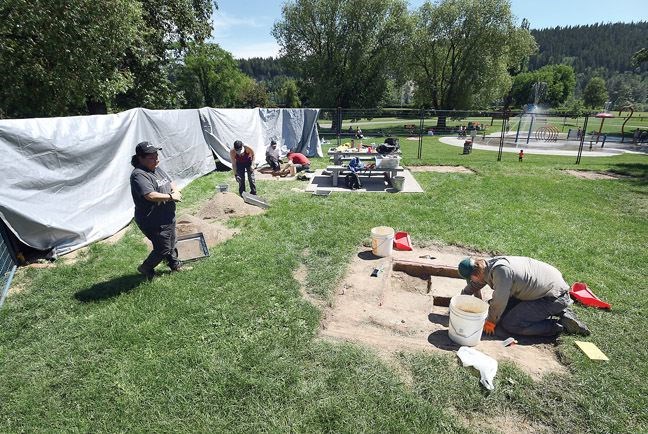A skeleton was found last week during the archeological excavation at Lheidli T'enneh Memorial Park where the new pavilion is to be constructed.
Lheidli T'enneh First Nation Chief Dominic Frederick, the archeology branch of the Ministry of Forests, Lands and Natural Resource Operations and city hall confirmed the discovery this week.
The city said a "full skeleton" was found at the site while Frederick said a small skull, a tibia an elbow and a hip bone from what appeared to be an infant or a woman were found about 18 inches below the surface.
Foul play is not suspect. Rather, it's believed the remains are from a grave site in the area dating back to when the land was part of a Lheidli T'enneh village.
For Frederick, the finding comes as no surprise but also brings back dark memories for the Lheidli T'enneh. In 1913, the village was burned down and its people forcibly moved to Shelley. Adding to the hurt, the cemetery was desecrated.
"What they did was they pushed everything into the river," Frederick said. "And in leveling the ground and smoothing it out, they scattered everything and then filled it in."
What will be done with the findings is dictated, in part, by the terms of a permit the city acquired from the ministry to carry out the work. Although it was renamed Lheidli T'enneh Memorial Park two years ago, it remains city-owned property.
"This permit anticipated that human burials might be located, and contains wording that reflects the Lheidli T'enneh's wishes, specifically regarding analysis," MFLRNO spokesperson Vivian Thomas said. "The archaeologist is also to consult with a forensic anthropologist to determine in the field if the condition of the remains will allow for analysis of age and date."
In a statement issued Wednesday, the city said some bone fragments and a copper button were also found during the dig and, in accordance with the permit, the skeleton is now being analyzed by a forensic archaeologist.
"The process going forward involves the completion of a report outlining the methodology involved in the excavation and documentation of what was discovered," the city said. "This becomes part of the archaeological record of the park area."
Work on the $779,000 project will proceed, the city also said, with construction to begin after Canada Day. Frederick had expected as much when reached earlier Wednesday.
"I know the remains will be brought back to us," Frederick said. "We'll store them for a period of time until our community decides what to do with them."
Frederick said the Lheidli T'enneh have mixed feeling about what's happened over the years. He said a monument in memory of the ancestors "and where they were found and where we believed they were supposed to be," is being mulled.
"With the ground being disturbed and the graves being disturbed, they ended up over in another area," Frederick said. "We don't want to put them back there, the elders have said you can't put them back to where they've been disturbed."



